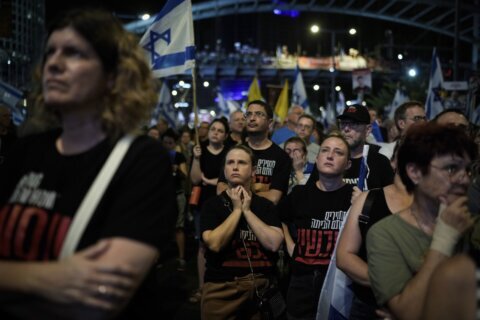SAN JUAN, Puerto Rico (AP) — Jamaican Prime Minister Andrew Holness announced Tuesday that his country would send two dozen soldiers and police officers to Haiti this week to boost a U.N.-backed mission led by Kenya to fight violent gangs.
The 20 soldiers and four police officers are scheduled to arrive Thursday and will join nearly 400 Kenyan police who arrived earlier this year and are working alongside Haitian police and military, said Vice Admiral Antonette Wemyss-Gorman, chief of defense staff for Jamaica’s military.
The Jamaicans will be responsible for providing command, planning and logistics support, Holness said at a news conference.
Jamaica had pledged a total of 170 soldiers and 30 police officers, but Holness said it wasn’t possible to deploy them all at once.
“It’s not practical,” he said, adding that facilities to host those arriving and a command structure need to be in place before the full number pledged is deployed. “We want a very successful operation.”
The initial number of police and soldiers announced by Holness surprised many and comes at a time when the U.S. government has warned that the Kenyan-led mission lacks money and personnel as it considers a U.N. peacekeeping mission as one way to secure more resources.
In recent days, the U.N. and Ecuador circulated a draft resolution obtained by The Associated Press asking the U.N. to start planning for a U.N. peacekeeping operation to replace the current mission. Such a proposal would have to be decided by the U.N. Security Council, which experts do not believe would approve it.
On Monday, U.N. Secretary-General António Guterres said “it’s very strange” that there is apparently no money available to support the Kenyan-led mission.
“I think countries should assume responsibilities and should come and provide the necessary funding,” he said.
Holness did not comment on the possibility of a U.N. peacekeeping mission but said the current mission “can be a long and extended process.”
He added that the mission is not the only or final solution to problems in Haiti, where gangs control 80% of the capital of Port-au-Prince.
The violence has spread to other areas across the country, with more than 3,200 killed from January to May, according to the U.N. The ongoing violence also has left more than half a million people homeless in recent years.
“Haiti is the example of what could happen if states and governments do not take the problem seriously and put in place the measures and resources necessary to bring the problem under control,” Holness said.
Overall, the mission is expected to have a total of 2,500 personnel, with the Bahamas, Bangladesh, Barbados, Benin and Chad also pledging to send police and soldiers, although it wasn’t clear when that would happen.
The mission is expected to cost roughly $600 million a year, although the U.N. has received only $68 million out of $85 million pledged so far. The U.S. and Canada have provided the majority of funds for now.
Copyright © 2024 The Associated Press. All rights reserved. This material may not be published, broadcast, written or redistributed.







